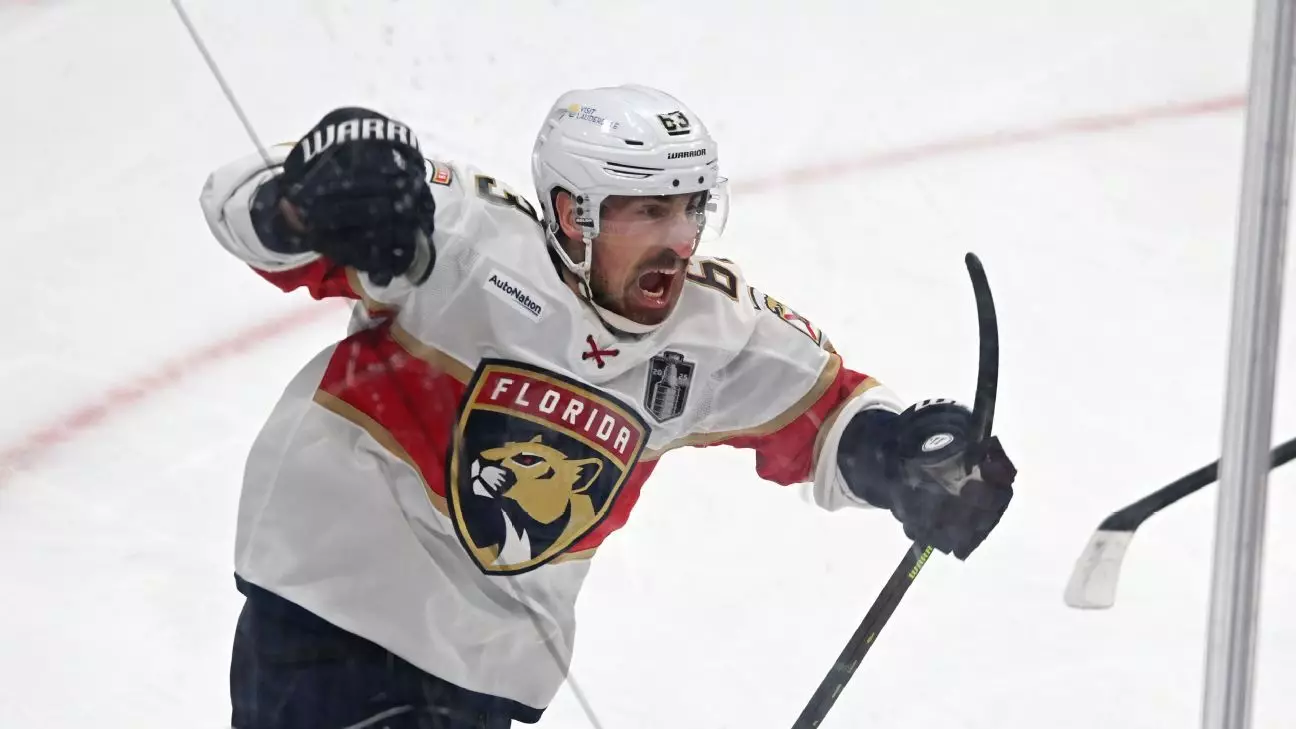The Strategic Path to Victory Brad Marchand’s Future in the NHL
As a passionate hockey fan, the exhilarating journey of Brad Marchand with the Florida Panthers is something I find truly captivating. The thrill of watching a player like Marchand, who is not only battling for a Stanley Cup victory but also navigating the uncertain waters of free agency, brings a certain drama to the sport. At 37 years old, Marchand stands at a pivotal point in his career, balancing his personal ambitions with the overarching dream of clinching that elusive championship trophy. This balanced approach speaks volumes about the high-stakes world of professional hockey.
Given Marchand’s situation, we are reminded of the intricate dance between individual goals and team aspirations in elite sports. While he ponders his future steps, the immediate goal—leading the Panthers to a Stanley Cup victory—remains at the forefront of his mind. As he once mentioned, “I’ve tried to avoid thinking about free agency,” focusing on the present challenges where every game is a crucial puzzle piece in their collective pursuit. It’s a mindset that reflects true leadership and an understanding that personal milestones are deeply entwined with team success.
Being a fan and observer, I can’t help but admire how Marchand’s story unfolds, painting a picture of determination and resilience. His narrative doesn’t just speak to hockey enthusiasts but also resonates with anyone who has ever faced balancing personal dreams with team objectives. It’s these stories that keep us glued to our screens, rooting for our favorite players while reflecting on our own life journeys.
Key Takeaways
- Brad Marchand faces an intriguing balance between pursuing a Stanley Cup win and navigating free agency.
- His focus on team success highlights the interconnectedness of personal and team goals in professional sports.
- The financial landscape, including tax considerations, plays a significant role in shaping player decisions in the NHL.
The Trade That Shook the League
When Brad Marchand was traded to the Florida Panthers from the Boston Bruins after contract negotiations hit an impasse, it sent shockwaves through the hockey community. Moving to a new team can be daunting, yet Marchand has handled this transition with remarkable ease. His performance speaks for itself: 23 goals and 28 assists over 71 regular-season games, followed by seven goals and ten assists during playoffs. These numbers not only demonstrate his enduring talent but also prove that loyalty can transcend historical affiliations when it comes to showcasing skill in the NHL.
Marchand’s contributions have been pivotal during this playoff run, emphasizing his indispensable value to the Panthers’ roster. Coach Paul Maurice has lauded Marchand’s exceptional abilities, reaffirming that players like him are indeed rare finds. The rapport he has cultivated with his teammates is evident, especially in critical playoff moments that have catapulted the Panthers into a position ripe with opportunity. It’s this synergy and shared ambition that invigorate fans and inspire confidence within the team.

The Financial Landscape Taxes and Team Performance
As Marchand weighs his options following this playoff season, financial considerations inevitably enter the equation. Playing for a U.S.-based team like Florida, which benefits from no state income taxes, presents lucrative incentives for any player contemplating free agency. Marchand understands that financial factors often extend beyond mere contractual figures when deciding on a team. Tax advantages can significantly influence decisions, particularly for seasoned veterans who have already amassed substantial wealth throughout their careers.
The discrepancy in taxation across different states raises questions about fairness within the league—a topic eloquently addressed by NHL Deputy Commissioner Bill Daly. While some argue that teams enjoying lower tax burdens hold an unfair competitive edge, traditionalists contend there are many reasons players choose their teams—be it camaraderie, historic franchises, or play styles aligning with their personal game strategies. When Marchand candidly remarked, “If you have two teams offering the same contract, you’re going to pick the team with less tax,” he opened up meaningful discussions around competitive balance and sustainability within professional hockey.
The Shift in NHL Dynamics
Navigating his future within an ever-changing NHL landscape presents unique challenges for Marchand. Teams like the Panthers and Tampa Bay Lightning illustrate an emerging trend where external factors such as tax implications increasingly influence player decisions. This shift demands more from teams lacking financial benefits as they strive to remain competitive by potentially allocating additional resources to entice top-tier talent while maintaining roster depth.
This complex financial backdrop adds layers of difficulty regarding cap space—a term frequently emphasized by Marchand himself as being vital for teams aspiring to win championships while ensuring roster stability. For teams without tax breaks, competing becomes more challenging as they must stretch resources further to attract star players without compromising roster quality or overall performance capabilities.

Ultimately, Marchand’s current season combined with looming free agency and broader economic dynamics within the NHL form a multifaceted tapestry worthy of analysis and reflection. Each moment spent on ice intertwines thoughts about future contracts with considerations of loyalty towards one’s team alongside an overarching pursuit shared by all athletes—victory in its truest sense. In these intertwined narratives lies Brad Marchand’s embodiment of blending personal ambition seamlessly alongside collective spirit defining both his illustrious career thus far while echoing through every corner comprising professional sports today.
Final Thoughts
Brad Marchand’s journey through this season provides profound insights into not only his character but also broader trends shaping modern-day professional sports landscapes globally speaking too! His ability adeptly manage balancing act between pursuing lofty individual achievements against backdrop unwavering commitment towards achieving ultimate glory alongside teammates serves inspiration countless others following suit out there right now themselves perhaps? Whether cheering him along sidelines home turf elsewhere altogether—rest assured knowing heart soul remain firmly planted midst pulse-pounding arena known simply put “the rink.” Here lies testament unwavering dedication passion perseverance hallmark defining greatness seen across countless arenas worldwide today tomorrow alike!
Brad Marchand
NHL
Florida Panthers
Stanley Cup


Leave a Reply